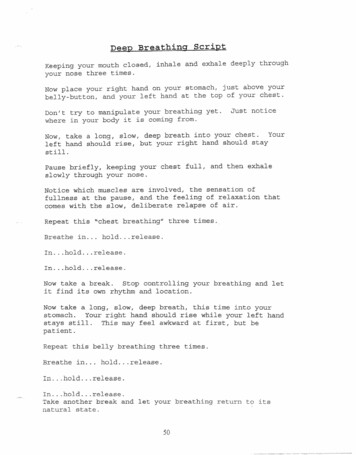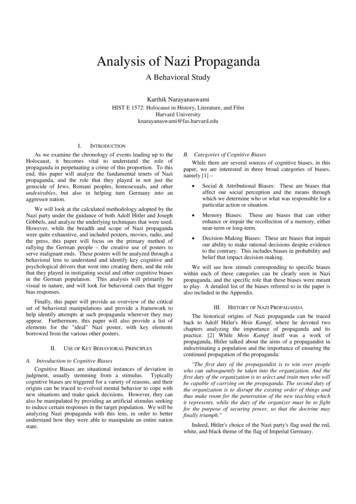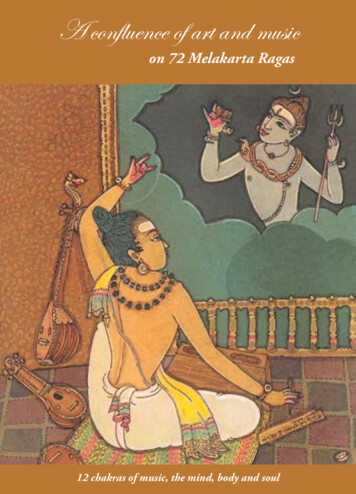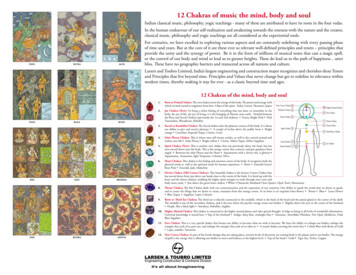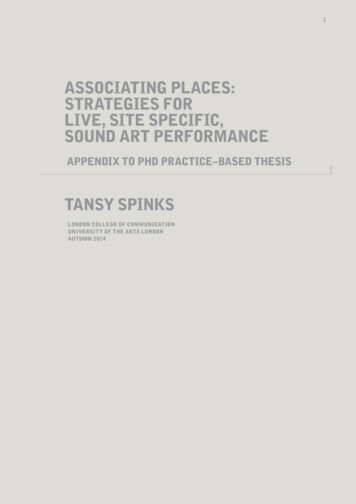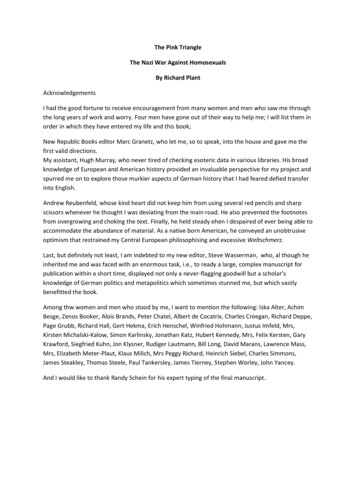
Transcription
The Pink TriangleThe Nazi War Against HomosexualsBy Richard PlantAcknowledgementsI had the good fortune to receive encouragement from many women and men who saw me throughthe long years of work and worry. Four men have gone out of their way to help me; I will list them inorder in which they have entered my life and this book;New Republic Books editor Marc Granetz, who let me, so to speak, into the house and gave me thefirst valid directions.My assistant, Hugh Murray, who never tired of checking esoteric data in various libraries. His broadknowledge of European and American history provided an invaluable perspective for my project andspurred me on to explore those murkier aspects of German history that I had feared defied transferinto English.Andrew Reubenfeld, whose kind heart did not keep him from using several red pencils and sharpscissors whenever he thought I was deviating from the main road. He also prevented the footnotesfrom overgrowing and choking the text. Finally, he held steady ehen I despaired of ever being able toaccommodate the abundance of material. As a native born American, he conveyed an unobtrusiveoptimism that restrained my Central European philosophising and excessive Weltschmerz.Last, but definitely not least, I am indebted to my new editor, Steve Wasserman, who, al though heinherited me and was faced with an enormous task, i.e., to ready a large, complex manuscript forpublication within a short time, displayed not only a never-flagging goodwill but a scholar’sknowledge of German politics and metapolitics which sometimes stunned me, but which vastlybenefitted the book.Among thw women and men who stood by me, I want to mention the following: Iska Alter, AchimBesge, Zenos Booker, Alois Brands, Peter Chatel, Albert de Cocatrix, Charles Creegan, Richard Deppe,Page Grubb, Richard Hall, Gert Hekma, Erich Henschel, Winfried Hohmann, Justus Imfeld, Mrs,Kirsten Michalski-Kalow, Simon Karlinsky, Jonathan Katz, Hubert Kennedy, Mrs, Felix Kersten, GaryKrawford, Siegfried Kuhn, Jon Klysner, Rudiger Lautmann, Bill Long, David Marans, Lawrence Mass,Mrs, Elizabeth Meter-Plaut, Klaus Milich, Mrs Peggy Richard, Heinrich Siebel, Charles Simmons,James Steakley, Thomas Steele, Paul Tankersley, James Tierney, Stephen Worley, John Yancey.And I would like to thank Randy Schein for his expert typing of the final manuscript.
PROLOGUEI fled Frankfurt am Main on February 27, 1933, the day the Reichstag went up in flames. I wasfortunate. My father, however, a physician, a veteran, a Socialist and a Jew, had been arrestedseveral weeks earlier. Because a few of his patients, though nominally members of the Nazi party,intervened in his behalf- this was possible during the early years of the Third Reich- he came homeafter only one month of imprisonment. He insisted I leave Germany as quickly as possible for Basel,Switzerland, and enrol at the university there. After encountering many obstacles, I succeeded inobtaining a passport, an object that had suddenly acquired enormous value. I gathered a fewbelongings and some luggage, and rushed to the Frankfurt railroad station to take the earliest trainthe Switzerland.Only years later did I realize how lucky I had been. Although the anti-Jewish and the anti-gay lawsbecame officially part of the Nazi onslaught of terror in 1934-35, the crusade against variousminorities had really begun long before. Brown shirted gangs of trigger –and hammer-happy youths,in an outbreak of “spontaneous” national outrage, had vandalized Jewish stores or thrashed thepatrons of the few timid gay bars in Frankfurt. By June 1933, a few Swiss newspapers had reportedwith near incredulity that Hitler’s threats in Mein Kampf to expunge his enemies had not beenempty posturing – that Jews, Social Democrats, Catholics, and labour leaders had been arrested ormurdered; that, in short, a revolution was rocking Germany to its already shaky foundations. TheSwiss never alluded to the Nazis’ anti-gay crusade –in part because this movement began only in fullin June 1935, but also because in the 1930s no self-respecting publication would dare to discuss sucha delicate subject. To what length the Nazi regime was prepared to carry the war against “nonAryans” no Swiss newspaper could foresee. Yet another agency concerned with the public good, theSwiss Foreign ministry in Berne, did exhibit a knack for anticipating Hitler’s moves.A few weeks after my arrival in Basel, I had gone to the university, a sixteenth-century fortressoverlooking the Rhine, to register as a graduate student in history and literature. About six monthslater the Foreign Ministry struck, ruling that foreign students could not attend classes in Switzerlandunless they had been in the country for a certain length of time and had been given a provisionalpermit of residence. Fortunately, because I had registered in February, I was safe. By the time I wasready for my first class at the fortress, I had found a place to stay in the eccentric household ofGabrielle Gundermann, a very unmarried old lady, tiny and vivacious, a former coloratura sopranoand telephone company employee. She insisted I call her “Miss Gaby”. I tried to settle down to thelife of a financially insecure alien student. Like other fugitive German students I met, I had fewforebodings of what was going to happen in Germany, though I harboured a profound worry. I spentsome nights sleepless with anxiety. Certain events in Germany gradually made the situation clearer.The Frankfurter Zeitung, for example, one of the better liberal German dailies, not only acquired anew editorial staff, but its tone began to change markedly. Jewish names disappeared from themasthead. The paper now seemed to speak in code. In contrast, the small local liberal daily, theBasler Nationalzeitung, began to print more and more news about Germany, most of it shocking.Throughout the Nazi years the paper resisted the pressure put on it by German interests andcompliant Swiss officials to change its anti-Nazi bias. Meanwhile, my father kept writing guardedletters to me. But he did not mention that one day the SS had put a uniformed guard in front ofevery Jewish physician. This I heard about late one night on Basel radio.
9 had left friends behind in Frankfurt. Ferdi Strom, an old classmate, had shared my brief tenure inone of the youth groups known as the Rovers. The leader of such a group usually expected themembers, as his disciples to be loyal if not devoted. Soon I had discovered that a Rover leader hadhis favourites. Whether this went beyond arm-on-the-shoulder familiarity I could not tell then. Insuch brotherhoods a few adolescents had a little affairs, misty and romantic sessions around ablazing fire in the dark of the forest. Other boys, more down to earth, talked openly about “goingwith friends” and enjoying it. The leaders of these groups tended to disregard the relationshipsblossoming around them –unless they participated- just as they paid scant attention to theideological debates that regularly erupted while we sat and talked around the campfire. I left theRovers, a vaguely romantic association of mostly middle class Protestant and Catholic teenagers, anda similar Zionist brotherhood when, as an older teenager, I fell in love with the cinema. From Ferdi’sletters I learned what happened to the youth groups. After 1933 the Nazi’s forcibly dissolved allindependent youth organisations, even the Catholic ones, hurled accusations of “homosexualdegeneracy” against their leaders, and embarked on a campaign to enforce strictly heterosexualbehaviour.By this time Ferdi, too, had left the Rovers. He also quit school. It was Ferdi who had explained anddemonstrated the mysteries of sex to me and my friends. He was basically a street kid, tough,truculent, and wise. But he did not hold it against me that he had menial job at a pharmacy while Iwent to university. I had not kept in touch when he joined the Communist Youth League. On thenight in 1933 when Hitler was inaugurated as chancellor, Ferdi phoned me very late, and his cursessounded drunk. A few weeks before my journey to Switzerland, I had gone to the pharmacy whereFerdi worked, and where I often picked up medicine for my father. I was shocked to see Ferdiwearing a brown shirt with a red, white, and black swastika armband, and I yelled at him. To Ferdithe brown uniform meant only that he could get a better job. He urged me to “get away from thismess,” and it was he who provided the useful channels for obtaining that indispensable passport. Henever wavered. After I had settled in Basel het started sending me unsigned postcards with badlyspelled messages that I could not always decipher, though mostly they concerned acquaintanceswho had disappeared or had been taken to jail.From the summer of 1935 on, Ferdi’s betrayed their meanings more clearly. Hans K, had “gone on along vacation,” and someone nicknamed Veeidt had been “transferred to Berlin.” I did not knowthen about the new antigay legislation that had been introduced. Soon I began bombarding myfather with letters urging him to leave Germany, even if it meant abandoning his patients and hisvaluable library.He did not listen to my pleas. My mother had died earlier of cancer; my sister, a musician, had foundrefuge in Holland- for a while. During my first term at Basel I had looked up distant relatives who lentsupport in many ways. For my part, I tutored reluctant children in German and Latin and wrote shortarticles on books and films (under a pseudonym) for the Basler Nationalzeitung. By this time theentire world had heard about the 1935 Nuremburg laws concerning “racial purity,” and about theconfiscation of “non-Aryan” properties and the edicts that made Jews into nonpersons. Yet theimpact of the state action against gays did not really hit me until much later. Had I looked throughthe pages of the easily available Volkischer Beobachter, I might have encountered the variousannouncements of the Fuhrer’s measures to cleanse the brave new Germany of criminal sexual
deviants. But neither I nor anyone I knew took the trouble to study the Volkischer Beobachterbecause its headlines trumpeted a political ideology that I refused to take seriously even in 1935.One day, in an envelope without a return address, I received a letter from another friend inFrankfurt, Eric Langer. Eric had been my main ally in my school years, and my one true friend. Hisfather had also been a physician, practising in the nearby village of Cronberg. During World War I,both of our fathers had worked in a hospital near Krakow, Poland. Toward the war’s end both werewounded; my father recovered from a splintered kneecap, but Dr Langer died of an infection shortlybefore the armistice. Hilda Langer, his wife, managed to keep the family going in Cronberg. Small,with dark eyes that seemed to give more compassion than they accepted, Hilda was always inrepose; she resembled a Durer woodcut without the harshness that those prints often convey. Myparents did whatever they could for her. Eric, a half-year older than I, spent as much time at ourhouse on Reuterweg in Frankfurt as I did at his farm in Cronberg. We attended the same school andconsidered ourselves cousins. The farm was my haven from the busy Frankfurt house and officewhere my father practiced, and I did not mind the exercises that Eric insisted I must do to getstronger and overcome my stuttering. I sense now that Hilda secretly furthered the friendshipbetween Eric and me. She was aware that I cared more for him than I could admit. Until I reachedpuberty I was a loner, and I stuttered with a vengeance. Whenever tension attacked me from within,the words left my mouth crippled, and I expected, and probably invited, my peers to make fun ofme. But from early on, Eric never giggled; he tried to persuade me that I was silly to worry about myhandicap. In high school, the venerable Goethe Gymnasium, I was nicknamed the Stick because I wasundernourished and a poor athlete. Eric’s unruly blond hair earned him the nickname of Lion. I wasdimly aware that Eric restrained his urge to protect and dominate me. Essentially, we had liked andunderstood each other from the day we first met at the Cronberg farm.At school, Eric excelled in all subjects. I faltered in some –math, physics, chemistry- while in others Ihad no trouble –history, Greek, Latin. Somehow we managed to keep the class bullies at a distance,and, not surprisingly, developed an aversion to the conservative patriotic clubs that the schoolpromoted among the pupils, in opposition to the supposedly liberal ideas of the post- World War IWeimar democracy. As it was, few of these ideas ever threatened the stuffiness of our institution.Eric was never fooled by false prophets or hyperbolic sloganeers of any denomination. Ge did notfeel comfortable with the Rovers and soon quit. I meandered first to a Zionist brotherhood and thendevoted most of my time to the film club. And although we talked for hours about sexual riddles, wenever crossed a certain unspoken barrier; Eric could not abide Ferdi and his insatiable sexualpursuits. Eric was not in Frankfurt when my world collapsed in January 1933. During a visit to hismother’s family in Holland he had fallen seriously ill, and returned to Frankfurt only after I hadescaped to Basel. Later I discovered that all his notes mailed to me before I finally settled at MissGaby’s had gone astray.Before I come to what has happened to some of our acquaintances, here is some news notpublished by anybody in Frankfurt. Have you heard about the Roehm murders? With that it started,the rounding up, the closing of the bars, and so on. No place is open here in Frankfurt. In return weare blessed with new sex laws. Our old buddy Harold said they can get you if you smile at anotherboy. This he told me before he went underground – I have no idea where he is. If he is alive.Remember the G.G. brothers? Arrested a week ago, put into Preungesheim jail. Remember Max?Supposedly in Dachau, near Munich. What little contact I had with Ferdi is lost but I’m afraid his SA
uniform is no protection with Roehm gone. A few he seduced on his endless expeditions would raton him quickly. Richard, you could never guess how many told on their former friends when theywere thrown in jail and “re-educated” by the bullies. Kurt, the pharmacist, near your house, wasdragged out of bed at 5:00 AM. They found his address book – the fool didn’t burn it or throw it inthe river. What happened at headquarters I can only guess – I haven’t seen him and don’t have thenerve to ask his mother. Oh, yes, you remember Bert? You will not believe it, he joined the SS gang,displays his elegant penmanship in their main office, and looks the other way when he spots me. Bythe way, my mother told me to assure you that your father still has a practice but is preparing toleave. She sees him twice a week, at least. Now don’t worry about me. I’m going to enlist in thenavy. Yes, I know, I should stay with you in Basel and perhaps latter we could get away from all this,far away, to Australia, Canada, or California. Mother wants me to, but how can I leave her?There followed some stern warnings. Under no circumstances should I consider visiting Frankfurt.For once, Eric insisted, I should think ahead without worrying. But my situation in Basel was shakytoo. The Swiss authorities in Berne were not friendly to émigré students. Not only were they notfriendly- they wanted us out and they absolutely did not care to have new ones. By somebureaucratic passport trick, Eric had heard, the Swiss could prevent Germans from entering as“tourists.” Didn’t I have family in the United States? I should start communicating seriously withthem. What bothered Eric most was that I would not be able to reach him after he began his navaltraining. He suspected that all mail would be censored. He promised to send anonymous cardswhenever he found a chance. I could mail unsigned messages to his mother, and when- not if – Ireached America, I must give an address. He would telephone her regularly; they had alreadyworked out a private code.For a while Eric sent noncommittal postcards from northern German cities, but beyond the fact thathe had joined a mobile naval training unit, they revealed little. I could not call Hilda in Cronbrg. Thejournalists on the Basel Nationalzeitung reported that people in Germany had been summoned toGestapo headquarters because they had received calls from outside the Third Reich. When I finallyleft for New York, I was cut off altogether from Eric and his mother. In an important way it was thememory of Eric that kept urging me on, decades later, to search out that rather little known area ofthe swastika tyranny, the hounding and slaughter of homosexuals under the Third Reich.At the end of the last letter I received in the packet, Eric indicated that one of our classmates,someone he identified only by the nickname Loko Buff, would visit me in Basel. Could I put him up?As it happened, Loko Buff, whose real name was Robbi Becker, showed up in the winter of 1936.Miss Gaby rang my bell, shouting that there was someone waiting for me. When I got downstairs, Idid not recognise Robbi and couldn’t muster a welcoming smile. Apparently he had lost so muchweight that his face had shrivelled. His blond hair had been clipped convict-style. As he climbed thenarrow stairs, he appeared old and numb. Miss Gaby knew this visitor could not pay much – hecarried only a small leather overnight bag- but she let him have one of the tiny attic rooms and didnot ask him to sign the register, as was required by law.But first we went to my room. When I finally settled Robbi into my best chair – faded red plush fromMiss Gundermann’s colouratura days- he began to talk, but at first only of how he managed to slipinto Switzerland. His father, the chief of the German Locomotive Workers’ Union, had mobilizedsome members who worked and lived in Lorrach, the German village facing the Swiss border near
Basel. Somehow they had managed to sneak Robbi across the border, and from there he had simplytaken a streetcar to my neighbourhood. Exhausted, Robbi fell silent and I decided to take him up tohis room, so he could gather himself.Only after he had been with me for a few days and had made friends with Miss Gaby, who evenpersuaded him to take some specially prepared food, did Robbi finally tell me what had happened tohim. In September 1935 he was arrested and jailed together with his father. At first the Gestapoauthorities tried to make him testify that his father had printed anti-Hitler leaflets. Later, when theyadded charges of “homosexual indecencies,” Robbi suspected that somebody had denounced him.He was sure the police had used the charge of “deviant sexual actions” to obtain further proofsagainst his father, a staunch Social Democrat. Although Robbi’s alleged sexual sins had taken placebefore the 1935 injunctions against homosexual activities were issued, this did not make him lessguilty; when it suited them, the Nazi legalists declared their laws to be retroactive. Robbi was neverallowed to comfort his partner in crime, or to have legal counsel.After Robbi had spent a few weeks in Preungesheim jail, a high-ranking SS officer in the Frankfurtpower structure bribed some lower SS officers and Robbi was dismissed with a stern commandnever to talk about his stay. Immediately he had someone gather a few of his clothes from home.Every second night he slept in a different place; he never visited his family again. And then,reluctantly, he showed me all the still-visible bruises and burns on his body. Because he would notrat on someone else, a guard had rammed an iron bar into his rectum, damaging his sphincter. Robbicould have saved himself much trouble if he had asked for medical help earlier. But he would not goto a Basel hospital – officials might ask for papers he did not have.Fortunately, among the Swiss students I had met, there was one who was close to completing hismedical finals. From the day I encountered Justus, he had always shown great concern for usforeigners, and I confided in him. Justus promised to look for a surgeon who would not askquestions, and a place where he could operate undisturbed. It was, he added, tougher than gettingan abortion. While Justus and his friend worked out the arrangements, Robbi and I talked aboutwhat could be done. One of his father’s brothers had emigrated to Sao Paulo and Robbi knew theaddress by heart- he had had enough sense to get rid of his address book well before he wasarrested. After long weeks of waiting, we received a reply from Sao Paulo. The Brazilian unclewondered why his nephew wished to leave a newly liberated and strong Germany, but neverthelesspromised to help.Justus also came through with a classmate willing to operate and a safe operating room. How theyovercame paperwork and avoided keeping records, I do not know. The operation went well, andRobbi recuperated under the care of Miss Gaby, who had grown fond of him, although she neverasked the nature of his surgery. Justus next enlisted the aid of another Swiss student, who was goingto Frankfurt. After making sure the apartment was not being watched, he visited Robbi’s mother tocollect some clothes and, above all, those papers precious to bureaucrats worldwide. He alsolearned that Robbi’s father was still in jail. As Robbi recovered and lost his air of depression, I heardfrom him too the details of the Roehm massacre, the new anti-gay rulings, and the subsequentpersecution. The Sao Paulo uncle finally mailed the steamship ticket plus some spending money. Wewaited weeks for the Brazilian consul in Zurich to grant a visitor’s visa. Finally, all was set. Robbi leftfor Genoa to board an Italian freighter bound for South America. Miss Gaby cried during those last
days of preparations, sure that the steamer would sink- and besides, who ever heard of anyonegoing to such a place as Brazil?Those four rooms in Miss Gaby’s attic were rarely left empty. Again and again, Jewish, Catholic, gay,and generally anti-Nazi friends and friends of friends would stay there for a while until they couldrefuge elsewhere. The wealthier ones, or those with sure contacts in Canada, America, Australia, orSouth America, usually succeeded in obtaining visas – though these were often dubious. In the largerSwiss cities and in France, a black market in passports and visas began to develop, so that, forinstance, a Jewish businessman from Frankfurt might find himself traveling to Santo Domingo with aPanamanian passport. Or a gay opera singer with a Paraguayan passport might book a berth on anEnglish steamer bound for Shanghai. To manage all this, to dominate this theatre of the absurd andthe blackly comic, demanded patience and a certain grit and toughness not granted to everyone. TheSwiss authorities would frequently not permit the refugee to stay longer than three weeks, but itusually took at least six months to negotiate the necessary papers. To my recurring dismay andhorror, many friends had no choice but to return to Germany. From there, few managed to keep intouch or survive – 9 simply lost them.After Robbi had reached Sao Paulo, I received a few letters from him, but we lost contact when Iemigrated to America. Fortunately, I took notes during our talks and remembered well what hewrote in his letters- my first interview, as it were with a gay survivor.
INTRODUCTIONThis book seeks to throw some light in a corner of modern history that has thus far remained toomuch in the shadows: the persecution of homosexuals under the Third Reich. Even today, fourdecades after Hitler’s defeat, many facets of the Nazi regime have not received full popular andscholarly attention; they have been crowded out, so to speak, by the horror of the major atrocity,the extermination of the Jews. The attempted systematic destruction of other, numerically smallergroups also caught in the maw of the Nazi terror, such as the Jehovah’s Witnesses, the Gypsies,antifascists of all shades, and nonconforming clergymen can only be presented marginally in thisstudy. Fuller presentation must be consulted elsewhere, or, in many cases, left to future researchers.The period directly following the collapse of Hitler’s Germany offered much immediate relief formost of the regime’s persecuted victims, in addition to giving them a platform to air to the worldtheir undeniable grievances- but not so for the gays. For one thing, the climate of the Cold War andthe conservative moralism of the Adenauer administration was not conducive to eliminating alltraces of Nazi jurisprudence, not including the 1935 antihomosexual laws, which remained in effectuntil 1969. For another, the nature of their “crimes” was so intimate that very few wished topublicise such a sexual preference or life style. Finally- and perhaps most curious of all- the moralityrate for homosexuals incarcerated by the Nazis was, it appears, relatively higher, in the camps andafter their release, than that of other persecuted groups. Rea searchers learned that the gays,marked by pink triangles, were a relatively small minority in the camps but had a proportionatelyhigher mortality rate than, for example, the more numerous political prisoners, who wore redpatches. As with all those who survived the jails, forced labour camps, and death camps, a largenumber died shortly afterward. Of those gays with whom researchers were able to make contact inthe 1960s and 1970s, an unusually high number died before initial interviews, and many did not liveto complete correspondences or accounts of their personal histories.Thus it is no accident that the first full length report by a gay ex-inmate, Heinz Heger’s The Men withthe Pink Triangle, appeared late, in 1972, followed in 1977 by the now classic investigative report,Homosexuality and Society, conducted by a team led by Rudiger Lautmann of Bremen University.This work offered the first truly reliable statistics on the persecution, arrest, imprisonment, and fateof German and Austrian homosexuals in various concentration camps. Although a few historians,notably Eugen Kogon in his pioneering Der SS Staat (1946), had called attention to the existence ofgay inmates in various camps, especially Buchenwald, it remained for Lautmann and his associates tomake known to a larger public the results of his definitive study carried out in part in the vastarchives of the International Tracing Service at Arolsen, West Germany.In 1980, Heger’s memoirs were translated and published in the United States and Britain.Unfortunately, they were generally ignored. On the other hand, Martin Sherman’s play Bent (1979),which based some of its plot on material in Heger’s book, was widely discussed. Bent opened theforbidden closet a crack and put the world on notice that indeed the Nazis had hounded allcontragenics1, that gays had been classified with criminals, asocials, and Jews as deviant subhumans,the cosmic lice that Hitler and Himmler had vowed to exterminate.1Contragenics is a term the linguist Richard J. Deppe has coined to encompass all those groups the Nazi regimeresolved to eliminate; Jews, antifascists, gays, Jehovah’s Witnesses, nonconforming clergymen, Gypsies, etc.
One might be tempted to conclude that before the late 1970s writers interested in tracing the Nazipersecution of homosexuals had little source material to draw upon. But this temptation must beresisted. For historians able to read german there was ample evidence available to prove thatHimmler’s storm troopers were as eager to get rid of the gays as they were to expunge othercontragenics. In fact, even for those who could read no German there was sufficient amount ofstatistical material and documentation on the subject- if they had wanted to focus on it.For a long time German historians also failed to discuss the plight of the gays during the Third Reich.Quite to the contrary, a few writers such as Konrad Heiden, with a sort of coy horror, offered hintsthat Hitler himself might have been a homosexual or at least some kind of sexual deviant. Thetechnique of homosexualising the enemy, employed by some émigré authors, can be understood asa thirst for revenge, but it does not excuse such gleeful illogic – they simultaneously depict Hitler aswickedly effeminate but stop short of proving that he was homosexual. What they did was to indicthim by association. Because SA chief Ernst Roehm was admittedly an active homosexual, thesewriters concluded that the dictator himself and all of his top henchmen must have shared Roehm’sinclinations. Luchino Visconti’s cinematic fantasy The Damned (1969) was among the worstoffenders in this regard. The movie featured a number of senior storm troopers in drag, thuspopularising the image of a homosexual Nazi elite. More tendentiously, the film promoted thetheory, believed by many intellectuals, that the incomprehensible Nazi crimes could be easilyexplained; the Nazis were simply homosexual perverts. (The tenacity of this view is exemplified byBernardo Bertolucci’s The Conformist [1971], based on the 1951 novel of the same name by AlbertoMoravia.) Nor was this theory new in the post war period. A Soviet film made in 1936 stressed thesame point. Gustav von Wangenheim’s The Fighters purported to tell the true story of the 1933burning of the Reichstag. It depicted the Nazis as homosexuals- the official Communist Party lineabout the German Fascists. Soviet officials quietly shelved the film in 1939 after Hitler and Stalinsigned the nonaggression pact. The film has never been publicly seen in the West.But this theory offers no explanation of why writers and historians have never fully addressedthemselves to the Nazi’s apparent homophobia- a fear that early on considered the gays assubhumans to be weeded out, root and branch, as Himmler put it. Take, for example, an avowedlyconservative biographer, Joachim Fest. In his excelle
with near incredulity that Hitler’s threats in Mein Kampf to expunge his enemies had not been empty posturing – that Jews, Social Democrats, Catholics, and labour leaders had been arrested or murdered; that, in short, a revolut



